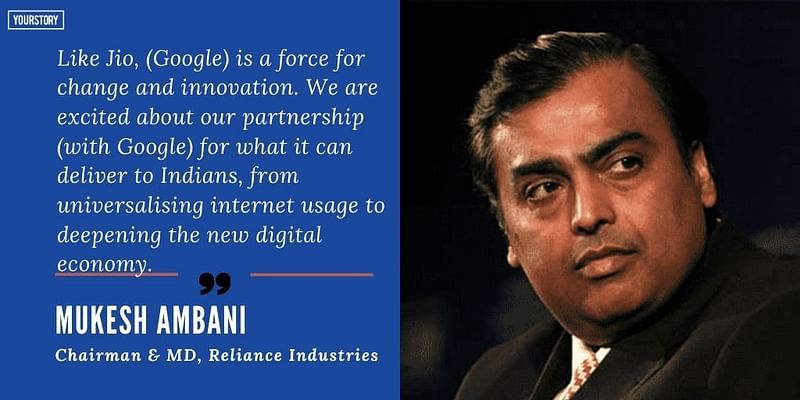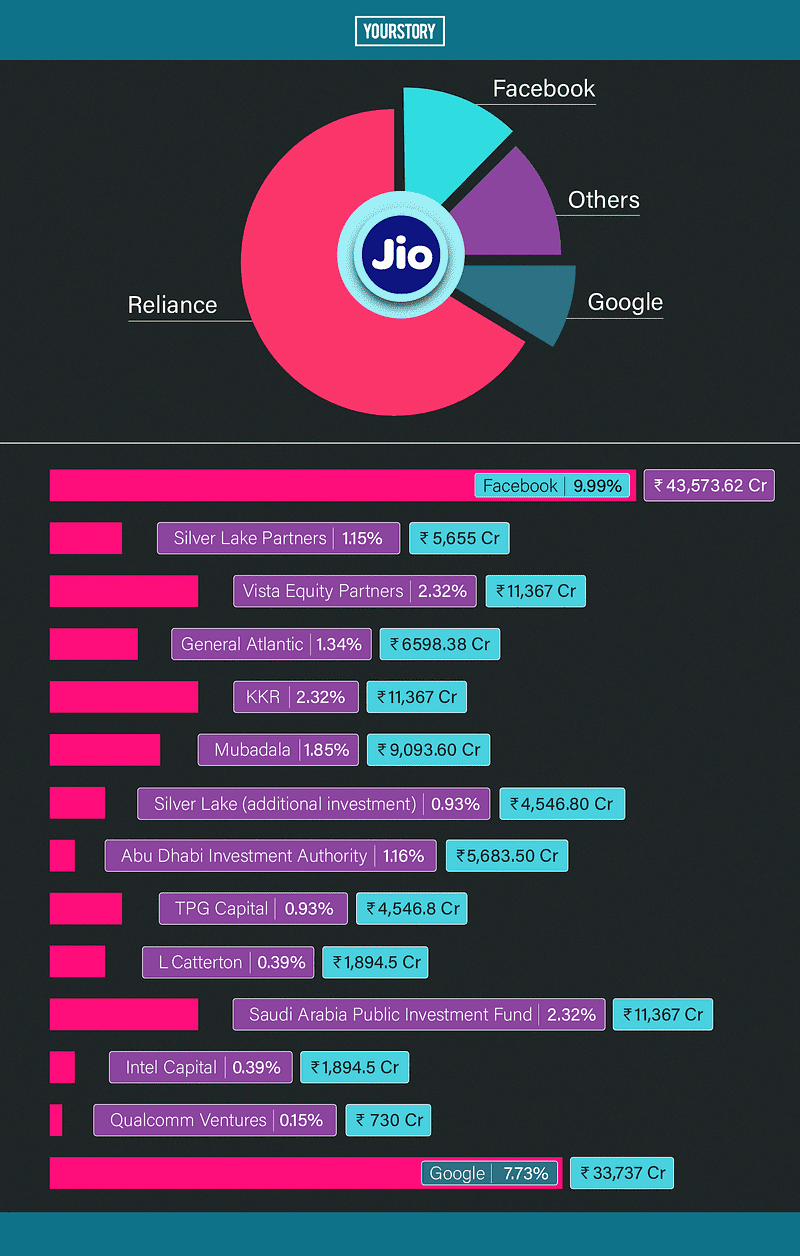“Business opportunities are like buses, there’s always another one coming.” – Sir Richard Branson
The above quote aptly sums up the year that was for Reliance Industries.
Even as the world came to a literal standstill due to the coronavirus pandemic, India’s most valued publicly listed corporation, managed to catch the bus — not once, but several times — to growth, prosperity, and business expansion.
The first quarter of 2020 wasn’t rosy for the oil-to-retail-to-telecom behemoth, with RIL stocks plummeting 39 percent from January to March due to a steep fall in global crude prices and subsequent stock market crashes.
It wiped off $21 billion from RIL Chairman Mukesh Ambani’s net worth, and he also lost the tag of ‘Asia’s richest person’ to Alibaba’s Jack Ma. Then came the overnight lockdown in March, which led to a stoppage in industrial activity.
But for giant business empires like RIL, there’s always another bus coming. While 2020 may have been the most challenging year for scores of businesses around the world, events that unfolded at Reliance establishes three things.
a) The unfettered global interest in a truly diversified business empire
b) RIL’s shift of focus from its traditional oil and petrochemical businesses to sunrise sectors like telecom, OTT, ecommerce, gaming, AR/VR, video-conferencing, etc.
c) The ability of cash-rich businesses to not only survive but also thrive during what Ambani called “the most disruptive event in modern history”.

RIL Chairman Mukesh Ambani with son Akash Ambani
Quick recap of milestone events
The tide turned towards the end of April, when RIL’s digital arm Jio Platforms set off an unprecedented continuous fundraise. Over three months, Jio went on to raise a mammoth $20 billion (Rs 1.52 lakh crore) in FDI from 13 marquee investors, diluting 33 percent equity to become net debt-free (more on this later).
Consulting firm EY indicated, in a report, that Jio’s staggering fundraise limited India’s overall funding dip in H1 2020 to under 10 percent.
“Jio accounted for more than half of the investments by private equity and venture capital funds, and if not for those, the overall activity would be much lower,” it said.
The serial fundraise also helped Ambani return to his position of Asia’s richest person, and eventually, break into the world’s top-five billionaires’ club as his fortune grew to $80.2 billion in August.
While H1 2020 was dominated by Jio, RIL turned its attention towards its retail division in H2 2020. A similar continuous fundraise was seen at Reliance Retail too, with a majority of Jio’s investors lining up to fund what would become India’s largest retail operator in the year.
By November, Reliance Retail completed a Rs 47,265 crore fundraise from top strategic and financial investors by diluting 10.09 percent equity. It also went on to acquire a bunch of companies and startups during the year (more on this later).
Earlier, in September, RIL’s market cap crossed $200 billion (about Rs 14.48 lakh crore), making it the first Indian company to breach the mark.
Ranked 48th, it also broke into the world’s top 50 most-valued companies. Now, Reliance is Asia’s 10th most valued firm in terms of market cap.

Infographic: Ahamed Thahir | YS Design
Why the world courted Jio Platforms
Since its launch in 2016, Jio has been Reliance’s fastest-growing division. It also holds the distinction of being the world’s fastest-growing telecom network.
But 2020 was proof that RIL’s ambitions for Jio were much broader and deeper than what meets the eye. And certainly, one that goes beyond 4G.
Sanchit Vir Gogia, Founder and CEO, Greyhound Research, told YourStory in a prior interaction, “Reliance always wanted to take Jio beyond connectivity. It was a data, technology, and ecosystem opportunity. Connectivity was just the lubricant."
"They had good foresight, and they knew that to be able to do more with their physical assets, they had to first expose customers online. People were not online because data was very expensive. Jio’s plan was to democratise data, get tonnes of people on its network, then sell them its other services," he explained.
As Jio soared, some of the world’s leading VCs, PEs, strategic investors, and sovereign wealth funds became the wind beneath its wings. While RIL needed the global buzz and an attractive ‘tech valuation’ for Jio, foreign investors needed a foothold into India — the world’s largest (open) consumer market.
“They know that Jio is not a digital opportunity alone. It is a hybrid or phygital opportunity, where RIL will marry its prowess in online and offline domains. All its services are now getting tied more closely under Jio,” Gogia added.

Photo: YS Design
First came Facebook, which signed its biggest cheque since acquiring WhatsApp in 2014, is now the largest minority shareholder in Jio.
Jio followed it up with a series of multi-billion dollar investments from Silver Lake Partners, Vista Equity Partners, General Atlantic, KKR, Mubadala, additional investments from Silver Lake, Abu Dhabi Investment Authority (ADIA), TPG Capital, L Catterton, Saudi Arabia's Public Investment Fund, Intel Capital, Qualcomm Ventures, and Google.
Incidentally, many of these investors specialise in scaling up tech-led businesses and taking them public. RIL is said to be eyeing a $100-billion IPO for Jio on foreign indices in the next 12 to 24 months.
It could even take Reliance Retail public separately. “We expect a break-up of the company in the next three to four years through the IPO of Jio and the retail business, which should further unlock shareholder value,” Bernstein Research stated.
In October, Jio became the first telco to cross 400 million subscribers, as per TRAI.

Infographic: Anubhav Anurag | YS Design
Reliance Retail: the dark horse emerges
Even though Reliance Retail preceded Jio by 10 years, it had been a bit of a dark horse in the RIL stable, with the latter grabbing headlines in recent years.
Reliance, however, had been steadily growing its retail footprint to 11,784 stores across 7,000 cities and towns, as per its FY20 annual report.
It notched up a presence across segments like food and grocery, apparel and lifestyle, consumer electronics, and fuel retail. But barring the electronics unit (Reliance Digital), RIL managed to create little impact in other segments.
In 2020, Reliance Retail wen through a total makeover, and became India’s largest retail operator, roughly 7X the size of its nearest rival — Avenue Supermarts (that owns D’Mart).
In August, RIL created a $26 billion retail empire after the acquisition of the debt-ridden Future Group for Rs 24,713 crore. The Kishore Biyani-owned company had been the pioneer of modern retail in the country.

Reliance Retail acquired Future Group to create India's largest retail empire.
While many mourned the slow demise of an iconic entrepreneurial journey, the acquisition helped Reliance Retail gain access to 1,800 Future Group stores across 420 cities, and pocket popular retail formats like Big Bazaar, fbb, Foodhall, Easyday, Nilgiris, Central, and Brand Factory.
The biggest impact of the deal is expected to be felt in the food and grocery segment, which accounts for over 65 percent of Indian retail.
Future Group stores stand to bring in additional business worth $5.5 billion in grocery alone for Reliance Retail, as per CLSA estimates. Add to that, the deal gives RIL more bargaining power over FMCG players, vendors, and logistics partners, along with easing its entry into smaller towns.
From September to November, Reliance Retail imitated Jio’s serial fundraise, inviting FDI inflows of Rs 47,265 crore from eight foreign investors: Silver Lake Partners, KKR, GIC, TPG and General Atlantic, Mubadala, ADIA, and PIF.
At a recent event, Ambani thanked Facebook’s Mark Zuckerberg for sparking off the “FDI avalanche”, and placing his faith in the Indian market in a year of “grief, fear, and uncertainty”.

Photo: RIL
Widening ‘new commerce’ offerings
Prior to the Future Group deal, Reliance Retail also acquired a majority stake in online pharmacy Netmeds for a cash consideration of Rs 620 crore.
“The addition of Netmeds enhances our ability to provide good quality and affordable healthcare products and services, and also broadens our digital commerce proposition to include most daily essential needs of consumers," Reliance Retail Director Isha Ambani said in a statement.
RIL's acquisition spree didn’t end here.
In November, it stunned India’s startup universe by acquiring furniture retailer Urban Ladder — once a darling of VCs — for Rs 182 crore in a fire sale. The Sequoia Capital-backed startup had been valued at Rs 1,200 crore in 2018, and Rs 750 crore in 2019.
Urban Ladder’s sharply declining valuation confirmed the perils of the online furniture biz, which accounts for just three percent of India’s overall furniture market.

Reliance acquired Urban Ladder for Rs 182 crore in a fire sale
Experts say Reliance’s entry into the space will create a handful of large furniture marketplaces, including Amazon and Flipkart. It will also expedite the growth of the segment as work-from-home continues to be the new normal.
RIL’s Netmeds and Urban Ladder acquisitions helped expand its portfolio of integrated online-to-offline services or ‘new commerce’.
Earlier in H1 2020, the company had also made big moves into the space with the launch of JioMart in 200 locations. JioMart is RIL’s O2O commerce platform, which seeks to digitise tens of millions of kiranas and small merchants across India. The service is already averaging half a million orders per day.
Needless to say, Reliance is at the forefront of India’s digital transformation, and will unlock several huge untapped markets over the next decade.
It has the world’s attention because — as Mark Zuckerberg puts it — “India is building local capabilities and tech capacity to power innovative new business models and provide the citizens access to digital financial inclusion. So, decisions that are made here shape the global discussion about how technology can drive more economic opportunity and better outcomes for people.”
Edited by Saheli Sen Gupta
Link : https://yourstory.com/2020/12/jio-reliance-focus-sectors-telecom-retail-new-commerce
Author :- Sohini Mitter ( )
December 23, 2020 at 05:20AM
YourStory






